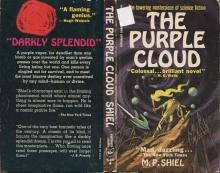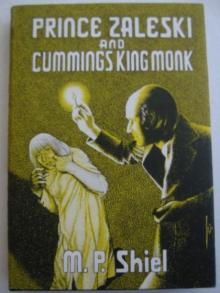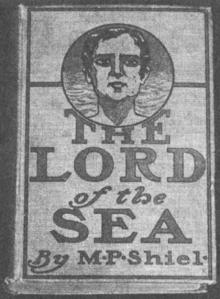- Home
- M. P. Shiel
The Purple Cloud Page 5
The Purple Cloud Read online
Page 5
dropped:
'That Peter takes atropine.'
Ah, I started then. She moved from the window, sat in a rocking-chair,and turned the leaves of a book, without reading. We were silent, sheand I; I standing, looking at her, she drawing the thumb across theleaf-edges, and beginning again, contemplatively. Then she laughed drylya little--a dry, mad laugh.
'Why did you start when I said that?' she asked, reading now at random.
'_I_! I did not start, Clodagh! What made you think that I started? Idid not start! Who told you, Clodagh, that Peters takes atropine?'
'He is my nephew: I should know. But don't look dumbfoundered in thatabsurd fashion: I have no intention of poisoning him in order to see youa multimillionaire, and a Peer of the Realm....'
'My dearest Clodagh!'
'I easily might, however. He will be here presently. He is bringing Mr.Wilson for the evening.' (Wilson was going as electrician of theexpedition.)
'Clodagh.' I said, 'believe me, you jest in a manner which does notplease me.'
'Do I really?' she answered with that haughty, stiff half-turn of herthroat: 'then I must be more exquisite. But, thank Heaven, it is only ajest. Women are no longer admired for doing such things.'
'Ha! ha! ha!--no--no longer admired, Clodagh! Oh, my good Lord! let uschange this talk....'
But now she could talk of nothing else. She got from me that afternoonthe history of all the Polar expeditions of late years, how far theyreached, by what aids, and why they failed. Her eyes shone; she listenedeagerly. Before this time, indeed, she had been interested in the_Boreal_, knew the details of her outfitting, and was acquainted withseveral members of the expedition. But now, suddenly, her mind seemedwholly possessed, my mention of Clark's visit apparently setting herwell a-burn with the Pole-fever.
The passion of her kiss as I tore myself from her embrace that day Ishall not forget. I went home with a pretty heavy heart.
The house of Dr. Peter Peters was three doors from mine, on the oppositeside of the street. Toward one that night, his footman ran to knock meup with the news that Peters was very ill. I hurried to his bed-side,and knew by the first glance at his deliriums and his staring pupilsthat he was poisoned with atropine. Wilson, the electrician, who hadpassed the evening with him at Clodagh's in Hanover Square, was there.
'What on earth is the matter?' he said to me.
'Poisoned,' I answered.
'Good God! what with?'
'Atropine.'
'Good Heavens!'
'Don't be frightened: I think he will recover.'
'Is that certain?'
'Yes, I think--that is, if he leaves off taking the drug, Wilson.'
'What! it is he who has poisoned himself?'
I hesitated, I hesitated. But I said:
'He is in the habit of taking atropine, Wilson.'
Three hours I remained there, and, God knows, toiled hard for his life:and when I left him in the dark of the fore-day, my mind was at rest: hewould recover.
I slept till 11 A.M., and then hurried over again to Peters. In the roomwere my two nurses, and Clodagh.
My beloved put her forefinger to her lips, whispering:
'Sh-h-h! he is asleep....'
She came closer to my ear, saying:
'I heard the news early. I am come to stay with him, till--the last....'
We looked at each other some time--eye to eye, steadily, she and I: butmine dropped before Clodagh's. A word was on my mouth to say, but I saidnothing.
The recovery of Peters was not so steady as I had expected. At the endof the first week he was still prostrate. It was then that I said toClodagh:
'Clodagh, your presence at the bed-side here somehow does not please me.It is so unnecessary.'
'Unnecessary certainly,' she replied: 'but I always had a genius fornursing, and a passion for watching the battles of the body. Since noone objects, why should you?'
'Ah!... I don't know. This is a case that I dislike. I have half a mindto throw it to the devil.'
'Then do so.'
'And you, too--go home, go home, Clodagh!'
'But _why_?--if one does no harm. In these days of "the corruption ofthe upper classes," and Roman decadence of everything, shouldn't everyinnocent whim be encouraged by you upright ones who strive against thetide? Whims are the brakes of crimes: and this is mine. I find asensuous pleasure, almost a sensual, in dabbling in delicate drugs--likeHelen, for that matter, and Medea, and Calypso, and the great antiquewomen, who were all excellent chymists. To study the human ship in agale, and the slow drama of its foundering--isn't that a quite thrillingdistraction? And I want you to get into the habit at once of letting mehave my little way----'
Now she touched my hair with a lofty playfulness that soothed me: buteven then I looked upon the rumpled bed, and saw that the man there wasreally very sick.
I have still a nausea to write about it! Lucrezia Borgia in her own agemay have been heroic: but Lucrezia in this late century! One could retchup the heart...
The man grew sick on that bed, I say. The second week passed, and onlyten days remained before the start of the expedition.
At the end of that second week, Wilson, the electrician, was one eveningsitting by Peter's bedside when I entered.
At the moment, Clodagh was about to administer a dose to Peters; butseeing me, she put down the medicine-glass on the night table, and cametoward me; and as she came, I saw a sight which stabbed me: for Wilsontook up the deposited medicine-glass, elevated it, looked at it,smelled into it: and he did it with a kind of hurried, light-fingeredstealth; and he did it with an under-look, and a meaningness ofexpression which, I thought, proved mistrust....
Meantime, Clark came each day. He had himself a medical degree, andabout this time I called him in professionally, together with Alleyne ofCavendish Square, to consultation over Peters. The patient lay in asemi-coma broken by passionate vomitings, and his condition puzzled usall. I formally stated that he took atropine--had been originallypoisoned by atropine: but we saw that his present symptoms were notatropine symptoms, but, it almost seemed, of some other vegetablepoison, which we could not precisely name.
'Mysterious thing,' said Clark to me, when we were alone.
'_I_ don't understand it,' I said.
'Who are the two nurses?'
'Oh, highly recommended people of my own.'
'At any rate, my dream about you comes true, Jeffson. It is clear thatPeters is out of the running now.'
I shrugged.
'I now formally invite you to join the expedition,' said Clark: 'do youconsent?'
I shrugged again.
'Well, if that means consent,' he said, 'let me remind you that you haveonly eight days, and all the world to do in them.'
This conversation occurred in the dining-room of Peters' house: and aswe passed through the door, I saw Clodagh gliding down the passageoutside--rapidly--away from us.
Not a word I said to her that day about Clark's invitation. Yet I askedmyself repeatedly: Did she not know of it? Had she not _listened_, andheard?
However that was, about midnight, to my great surprise, Peters openedhis eyes, and smiled. By noon the next day, his fine vitality, which sofitted him for an Arctic expedition, had re-asserted itself. He was thenleaning on an elbow, talking to Wilson, and except his pallor, andstrong stomach-pains, there was now hardly a trace of his late approachto death. For the pains I prescribed some quarter-grain tablets ofsulphate of morphia, and went away.
Now, David Wilson and I never greatly loved each other, and that veryday he brought about a painful situation as between Peters and me, bytelling Peters that I had taken his place in the expedition. Peters, atouchy fellow, at once dictated a letter of protest to Clark; and Clarksent Peters' letter to me, marked with a big note of interrogation inblue pencil.
Now, all Peters' preparations were made, mine not; and he had six daysin which to recover himself. I therefore wrote to Clark, saying that thechanged circumstances of course annulled my acceptance of hi
s offer,though I had already incurred the inconvenience of negotiating with a_locum tenens_.
This decided it: Peters was to go, I stay. The fifth day before thedeparture dawned. It was a Friday, the 15th June. Peters was now in anarm-chair. He was cheerful, but with a fevered pulse, and still thestomach-pains. I was giving him three quarter-grains of morphia a day.That Friday night, at 11 P.M., I visited him, and found Clodagh there,talking to him. Peters was smoking a cigar.
'Ah,' Clodagh said, 'I was waiting for you, Adam. I didn't know whetherI was to inject anything to-night. Is it Yes or No?'
'What do you think, Peters?' I said: 'any more pains?'
'Well, perhaps you had better give us another quarter,' he answered:'there's still some trouble in

 The Purple Cloud
The Purple Cloud Prince Zaleski
Prince Zaleski Lord of the Sea
Lord of the Sea